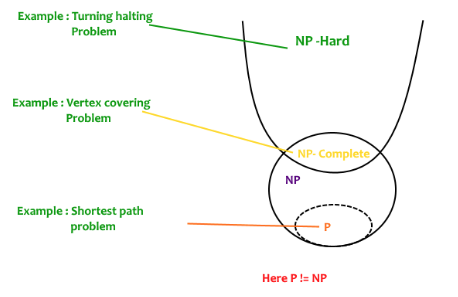NP - Completness
– (A determinstic computer is what we know) – A nondeterministic computer is one that can “guess” the right answer or solution
P is a set of problems that can be solved by a deterministic Turing machine in Polynomial time. More specifically, those are the problems that can be solved in O(n^k) time for some constant k, where n is the size of the input.
NP is set of decision problems that can be solved by a Non-deterministic Turing Machine in Polynomial time. P is subset of NP (any problem that can be solved by a deterministic machine in polynomial time can also be solved by a non-deterministic machine in polynomial time). Informally, NP is a set of decision problems that can be solved by a polynomial-time via a “Lucky Algorithm”, a magical algorithm that always makes a right guess among the given set of choices.
NP-complete problems are the hardest problems in the NP set. A decision problem L is NP-complete if: 1) L is in NP (Any given solution for NP-complete problems can be verified quickly, but there is no efficient known solution). 2) Every problem in NP is reducible to L in polynomial time.
A problem is NP-Hard if it follows property 2 mentioned above, doesn’t need to follow property 1. Therefore, the NP-Complete set is also a subset of the NP-Hard set.
A lot of times you can solve a problem by reducing it to a different problem. We can reduce Problem B to Problem A if, given a solution to Problem A, I can easily construct a solution to Problem B. (In this case, “easily” means “in polynomial time.“).
